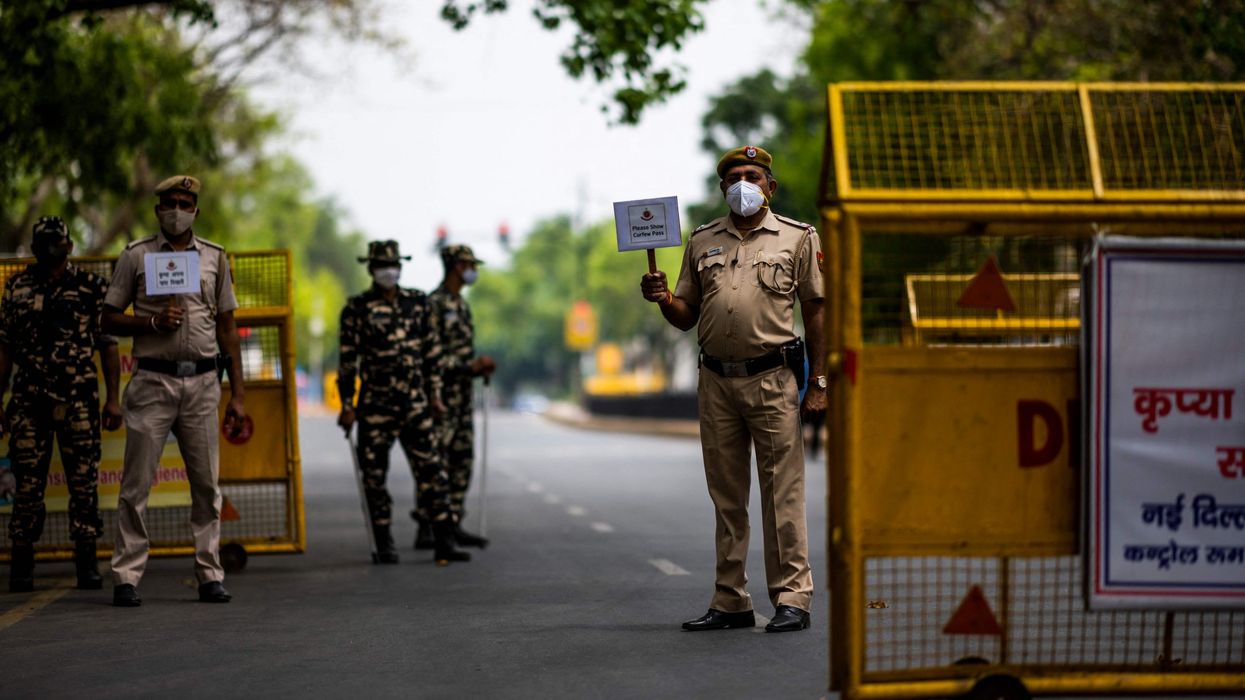India's capital New Delhi on Sunday extended its lockdown as the country's Covid-19 crisis grew with infections and deaths hitting record highs.
The announcement came as the healthcare system struggled to cope with the huge surge, with reports of severe oxygen and medicine shortages and patients' families pleading for help on social media.
The vast nation of 1.3 billion people recorded 349,691 fresh cases and 2,767 deaths in the last 24 hours -- the highest since the start of the pandemic.
The northern megacity -- home to 20 million people and the worst-hit in India -- had imposed a weeklong lockdown on Monday.
"We have decided to extend the lockdown by one week," Delhi chief minister Arvind Kejriwal said.
"The havoc of corona(virus) continues and there is no respite. Everyone is in favour of extending the lockdown."
Delhi on Saturday reported just over 24,000 new cases -- with more than one-quarter of those tested returning positive results -- and a record-high 357 deaths.
The country has administered almost 141 million vaccine shots so far, but experts say the mass inoculation programme needs to be significantly stepped up to combat the worsening outbreak.
Prime minister Narendra Modi said in a monthly radio address Sunday that India had been shaken by a "storm", and called on people to get vaccinated and not "get swayed by any rumour about the vaccines".
There's been growing criticism of Modi's government over allegations it was caught underprepared ahead of the surge.
On Sunday, Twitter confirmed it withheld dozens of tweets critical of the unfolding crisis at the request of the Indian government.
The social media giant said the tweets were blocked in India after a legal demand from New Delhi, months after similar action was taken against comments critical of the government's new agriculture laws that sparked violent protests.
Some tweets included comments, including from regional opposition lawmakers, about the overwhelmed healthcare system.
- 'Watched him die' -
In the last seven days, India has recorded more than two million cases -- an increase of 58 percent on the previous week, according to data compiled by AFP.
Indian-administered Kashmir on Saturday became the latest region to impose curbs on movement and activities as it announced a weekend lockdown.
Vinod K. Paul, a member of the government advisory body NITI Aayog, warned in a presentation to the prime minister and state leaders on Friday that daily cases could rise to as high as half a million by mid-May.
"(The) number of deaths may increase due to lack of treatment facilities," the Indian Express reported Sunday, citing the presentation.
Numerous reports have emerged in badly affected regions of some patients dying even before they were admitted to hospitals.
"He was gasping for air, we removed his face mask and he was crying and saying 'save me, please save me'," Mohan Sharma, 17, said of his father, who died in a queue outside a northeast Delhi hospital.
"But I could do nothing. I just watched him die," Sharma told AFP.
- Boosting oxygen supplies -
The government has stepped up its efforts to provide oxygen supplies through special trains and airlifts of containers from other countries including Germany, Singapore and Saudi Arabia.
More than 500 oxygen-generation plants were also to be set up in government hospitals, the health ministry said Sunday.
Businesses and entrepreneurs have said they would pitch in as well.
US Secretary of State Antony Blinken on Sunday tweeted that the administration was "working closely with our partners in the Indian government".
"We will rapidly deploy additional support to the people of India and India's health care heroes," he added.
Arch-foe Pakistan offered medical equipment and supplies after Prime Minister Imran Khan tweeted prayers for a "speedy recovery".
The neighbouring country is also struggling with the virus and on Sunday reported 157 deaths in the previous 24 hours -- the highest since the start of the pandemic.
Sri Lanka passed 100,000 cases on Sunday, while the tiny Himalayan nation of Bhutan, which has vaccinated more than half of its population with first vaccine shots, has reported 1,000 overall infections.












